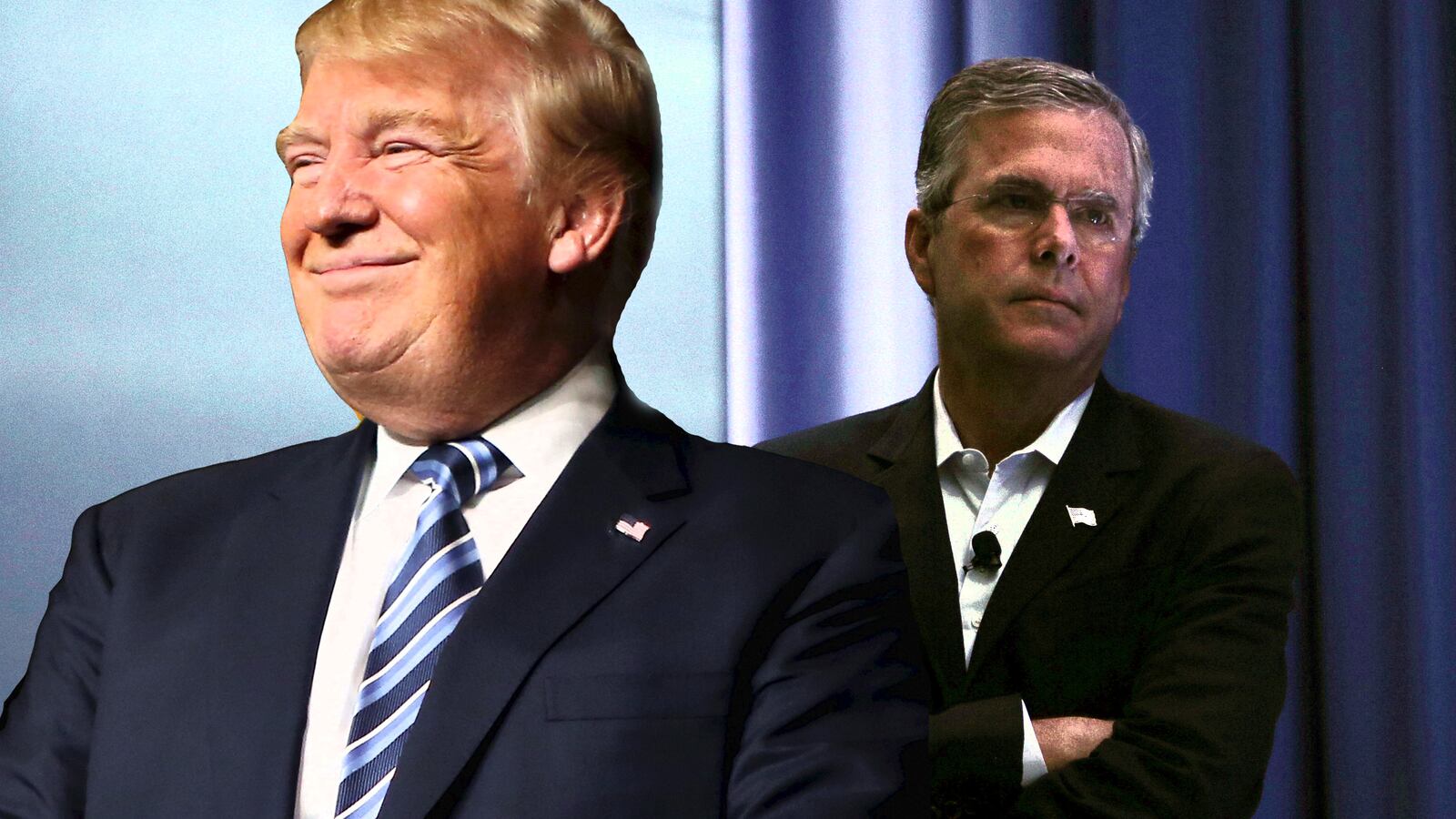In jujutsu, one uses an opponent’s weight against him. And, in the version most often seen in politics, a candidate turns his opponent’s strength into a weakness. In political jujutsu, assets can become liabilities.
In 1992, Bill Clinton faced off against George H.W. Bush. The latter had been a congressman, U.S. ambassador to the United Nations, chairman of the Republican National Committee, special envoy to China, director of the Central Intelligence Agency, and Vice President of the United States. By contrast, Clinton was governor of the 32nd-largest state—Arkansas.
If that election had boiled down to résumés, Bush would have walked off with it. But the Clinton War Room created a new narrative that revolved around youth, energy, fresh ideas. They made Bush’s experience a liability instead of an asset.
Now, in 2015, Donald Trump has employed the same strategy against Jeb Bush, and quite effectively at that. In most polls, Bush seems cemented in fifth place—behind Trump, Ben Carson, Marco Rubio, and Ted Cruz.
In the lead-up to the 2016 election, one of Bush’s major strengths was thought to be his strong appeal to Hispanic voters. Republicans were still smarting from Mitt Romney’s decisive defeat in 2012 at the hands of an incumbent president who enjoyed a wide margin of support from Hispanics. Romney did horribly with those voters.
Hispanics have a disproportional importance to the political process for three reasons—youth, unpredictability, and location. First, they’re younger than most other groups of voters; Hispanics have a median age of 27, compared to 37 for the overall U.S. population. So they’ll be around for a while.
Next, while the majority of Hispanics are registered Democrats, they have shown a willingness to cross party lines to support moderate Republicans. George W. Bush is the prime example, winning 44 percent of the Hispanic vote in 2004.
And lastly, they represent a significant presence in three “purple” battleground states: Colorado, Florida, and Nevada.
As Republicans proceeded to do an autopsy on Romney’s defeat, two different schools of thought emerged. Either the GOP nominee came up short because he hadn’t inspired enough white conservatives to come out, or because he had done such a poor job of reaching out to those voters who don’t typically vote Republican—especially Hispanics.
For those in the first school, the problem was that the party had nominated the wrong person. A more dependable conservative, they reasoned, could have done a better job of bringing out the GOP base.
Those in the second school agreed that the GOP needed to get behind a different sort of candidate in 2016. But, for them, the problem wasn’t that Romney didn’t excite the base but that he did nothing to widen it.
That’s the view of former White House political adviser and GOP strategist Karl Rove, who during a recent appearance on MSNBC’s Morning Joe shot down the idea that there was some “magical cache of conservative voters” that could save the day in 2016. Instead, he argued, the emphasis for Republicans should be on peeling off voters that traditionally vote Democratic.
Asked if Donald Trump could win the general election, Rove said, “My view is no, but we’ll see.” Asked to explain why not, he referred back to the party’s nominee in 2012.
“If Mitt Romney lost with 27 percent among Latinos,” Rove said, “how good would someone do when he’s got an 11 percent approval rating among Latinos?”
Rove and Co. decided early on in the prep for 2016 what was needed was a Republican with a proven track record of appealing to Hispanic voters, getting them out of their Democratic comfort zone, and showing them enough respect that they actually consider voting for the Republican nominee for president.
That candidate was supposed to be Jeb Bush, who had all the ingredients of being the most Hispanic-friendly Republican candidate in history. Bush speaks fluent Spanish, has a Mexican-born wife, spouts moderate views on immigration, and won more than 50 percent of the Hispanic vote in each of his Florida gubernatorial races in 1998 and 2002.
Bush was supposed to be the peacemaker who mended fences with Hispanics, and reassured them that Romney’s cold shoulder notwithstanding, they were indeed welcome in the Republican Party. Mi casa es su casa.
But with a series of deft maneuvers, and a little political jujutsu, Trump managed to turn Bush’s asset into a liability that essentially took him out of the race.
When Bush described as “an act of love” the concept of a Mexican immigrant traveling north to the United States—even without proper documents—in order to reunite with family members or to support a family back home, or when Bush spoke to Hispanic crowds in Spanish and fielded questions from Spanish-language media in the same language, or when Bush told an audience in New Hampshire that he had a “grown up plan” to deal with immigration that combined border security with earned legal status for the undocumented, Trump pounced. And pounced. And pounced some more. In tweets, speeches, and jabs, Trump has learned to effectively use Bush’s own words against him.
On one occasion, the weapon wasn’t Bush’s choice of words but something much more personal: His choice of a life partner.
In July, Trump advanced the theory that Jeb’s moderate views on immigration stem from the fact that his wife, Colomba, was born in Mexico. It started with a tweet created by a third party, but retweeted by Trump’s account, which asserted: “Jeb Bush has to like the Mexican Illegals because of his wife.” The tweet was later deleted. Colomba Bush came to the United States legally, and eventually became a U.S. citizen.
During an interview on CNN’s AC360, Trump was asked by Anderson Cooper if he authorized the retweet. He said he didn’t, but also that he didn’t regret that the retweet went out from his account. Then, in so many words, he restated the accusation.
“I don’t regret it,” Trump said. “I mean, look, I would say that he would. If my wife were from Mexico, I think I would have a soft spot for people from Mexico. I can understand that.”
Understand this. All these things—that Bush speaks Spanish, supports legal status for the undocumented, married a woman from Mexico—feed the narrative that Trump has pushed to working-class whites since he first began attacking the establishment’s candidate: “Bush isn’t for you. He’s for the Mexicans.”
It’s not unlike the accusations from some on the right wing in 2008 that Barack Obama, if elected, would be a president for African Americans but no one else.
As a Mexican-American, I knew this day would come—when someone who spoke Spanish and had moderate views on immigration would be accused of being too close to “the Mexicans.” But I never imagined the accusation would be hurled at a white guy.
Using political jujutsu, Trump will probably keep Bush out the top tier of GOP presidential candidates until that moment when Bush drops out of the race altogether.
And that’s a real shame. Bush isn’t the perfect candidate, but he’s a serious person who could step into the role of president on Day 1. He could also move his party forward on immigration and help make things right with a group of voters who Republicans can’t afford to write off. Besides, by all accounts, he’s a good man. That can’t be said of his chief nemesis. What Trump did to Bush was evil. Brilliant, but evil.






